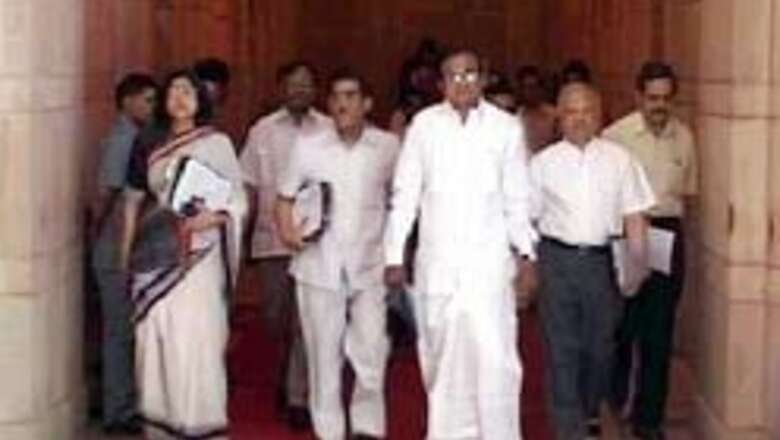
views
New Delhi: Finance Minister P Chidambaram tabled the Economic Survey for 2006-07 in Parliament on Tuesday.
It seems that there is more bad news for the Congress Government as the survey says prices are not coming down soon.
The survey suggested that the Government should brace up for a bout of sustained inflation. Unless supply of essentials is increased, prices won't be tamed.
However the good news is that the economy has decidedly taken off to a higher growth phase. It needs to be sustained without upping inflation.
The survey cautioned that a quick fire solution to shoot inflation was difficult, and it asked the government to calibrate policies to ensure a high nine per cent growth and arrest prices.
"Finding immediate answers to inflation induced by commodity-specific supply shortfall is difficult. The fight against inflation has to be calibrated without compromising growth," the economic survey said.
The survey also said that sustaining and managing the growth would remain its priority area.
"A sense of optimism characterises the current economic conjuncture. Fostering the momentum of growth continues to be a top priority," the survey indicated.
Eco survey on inflation
- Expects pressure on prices during this year - Says short supply of staples, high global prices the reason - Demand fed by high growth, foreign inflows, money supply, credit - Impact of duty cuts, dear-money policies to be felt shortly - But inflation will remain unless supply of staples improves
PAGE_BREAK
Projecting an economic growth of 9.2 per cent in 2006-07 on top of nine per cent in the previous year, the survey remains optimistic about sustaining the growth trajectory.
Despite a widespread criticism of the perceived role of futures market in stoking inflation, the Government appeared steadfast in recognising the positive contribution of the commodity exchanges.
Recognising subsidies as an important fiscal policy tool for correcting market failures, the Survey underscored the need for alternative and more effective delivery mechanism.
"The inconclusive debate on subsidies needs to be reviewed. Alternative mechanism for delivery of subsidy are available. They must be tried at least on a pilot basis and the experience should lead to the invention of alternative and more effective mechanism," it said.
The Survey, considered to be the report card of Government's performance as also its policy statement, emphasised that measures be formulated for improving the supply particularly of the agricultural commodities.
It listed the downside risks emerging from unraveling of global macro economic imbalances, volatile oil prices and delays in the completion of Doha Round of trade negotiations.
The thrust areas identified in the document include education, health and poverty alleviation to make growth more inclusive. It also highlighted the need for fresh impetus behind infrastructure.
Emphasising that expansion of employment in the industrial sector would require attention, the government pressed for an optimal level of flexibility in labour laws.
"The formation of appropriate skills through a wide variety of vocational training as well as optimal degree of flexibility of labour laws are important aspects," the survey reported.
The insurance and pension funds - areas where the Government has been unable to push reforms 0 have been linked to the development of infrastructure by the economic survey.
The Survey also called for a vibrant bond market, which could become a vehicle for investment for infrastructure development.
Although the problems in the power sector continued to remain in the short term, enough generation capacity would get added in the medium term.
The progress in road and highways would depend on rapid removal of constraints such as delays in land acquisitions, removal and shifting of utilities and law and order problems in some states.
Asking the Government to resist temptation of fiscal profligacy, the survey listed the potential pressure on expenditure as a considerable downside risk.
"Expenditure management, particularly careful monitoring of outcomes of outlays and targeting of subsidies, remains an unfinished task. Considerable downside risks remain from potential pressures on expenditure front," it said.
PAGE_BREAK
However, it noted buoyancy on the revenue side coming from the tax collection of both the Centre and the states.
The survey highlighted a unique role played by the Right to Information Act (RTI) in improving the monitoring and implementation of various social sector schemes. The buoyant economy should lead to faster social sector development mainly through employment generation.
Like all other recent government documents including the 11th Plan Approach Paper and the President's address to joint sitting of Parliament, the economic survey made a mention on how the minorities, particularly the Muslims have remained backward.
Likewise, the survey enumerated various steps for the development of other backward classes.
Describing monetary policy as an important tool to tame inflation, the survey indicated that the days of fast credit growth seem to be over, even though such trend may continue to out-pace GDP numbers.
"The rapid rise in credit growth in recent years has reflected and also helped the growth momentum. But it is unlikely that this will grow as fast as in the recent past," it said.
It said the credit policy would have to steer a careful path of maintaining the international competitiveness of the domestic economic activities, underscoring the importance of keeping interest rates in check.
The February rainfalls have improved the prospects of agricultural productivity in the short term. The prospects of wheat and other rabi crops have brightened while production of cotton, sugarcane and jute would set new records in the current year.
However, the production of oilseeds is expected to witness a decline of 15.7 per cent. "In the medium term, the prospects of agriculture would be determined by the pace and quality of reforms in the sector," the Survey said.
With agency inputs



















Comments
0 comment